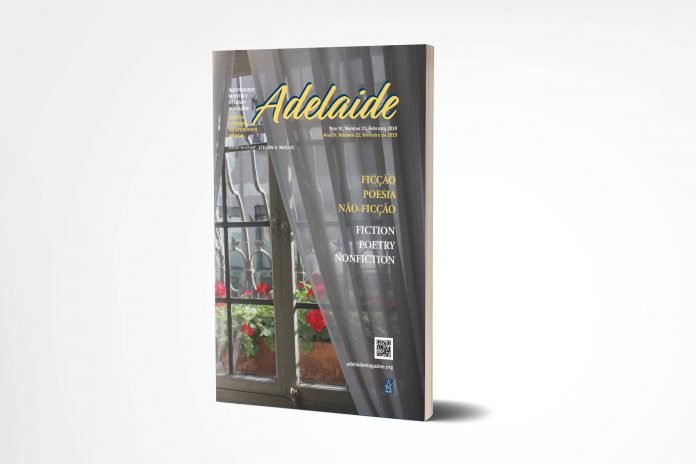EMILY
by Luke Francis Beirne
I: Emily, February 14th
The wind started:
blowing and gusting
across the ground,
fresh snow covered
most of the red.
Frayed strands
of a welcome mat
poked through the snow
at her feet.
Blinds hid most of the room.
Bottles and cans were scattered on the floor.
She knocked.
She listened.
She waited.
From the back of the house:
The tilt of a white hill;
A valley densely covered
in lightly powdered evergreens;
The air was crisp;
The sky blue.
She lifted herself
to the window
and peered through.
A reflection of the snow
and the trees behind her,
and the sky – the moon
and it hung out of place
in the blue.
In the kitchen:
A coffee pot sat on the counter;
An ashtray on the table,
littered with cigarette butts
and roached joints.
She’d sat at that table
many times, years before
and lost days to coffee
and evenings to wine.
And as they talked,
and laughed,
they danced
around the big topics
and, sometimes,
when the wine was heavy,
and the time was right,
they addressed them directly.
The dance itself
was enough
most of the time.
There was a mark
on the window above the chair
that Ronnie used to sit in.
Emily touched it gently.
She could feel it,
trace it – catch it
in the ridges
of her fingertips.
She stepped back,
looked from a distance,
but could only see it,
from the angle
she’d been at before.
She moved close
and touched the glass again.
Looking down:
Lying in the snow,
completely unseen until now,
a small brown bird.
Half buried,
its right wing stuck
straight up in the air.
She could have stepped on it,
but hadn’t.
Besides the tufts of feather,
the snow around the bird
was smooth and untouched.
She looked for something
to move it with,
but couldn’t see
a thing to use.
She pushed
a mound of snow
over the bird
with her foot.
And walked back
around the house
to her car.
II: Emily, February 14th
When mom died,
she’d found her in the closet
in the middle of the night –
something had woken her,
and she didn’t know what.
She tried to scream,
but couldn’t,
so, she leaned against the wall
and cried for a very long time.
Eventually,
she crawled back
to her room
and got into bed
and hid beneath the blankets.
She was young:
She didn’t know
what else to do.
She lay there – awake
and praying and crying and shaking –
until the birds began to sing
and the sun grew up the wall
and ceiling from between the curtains.
After a long, long time
she heard her brother scream –
she didn’t know which,
she never found out.
She heard her father cry,
for the only time in her life.
A power like nothing else,
And broken.
The ambulance
came up the road:
The crackle of tires
on the gravel driveway
and doors opening
and closing and boots
on the stairs; the calm
rushed sounds of
paramedics working
and angry yells
from her father.
She hated the birds
outside of the window
and she hid under the blankets
to get away from the light.
No one came to wake her,
and so she lay there
and lay there
until it was all quiet
in the tidy little house.
About the Author:
Luke Francis Beirne was born in Ireland and currently lives in Canada. His short story “Models” was published in the Honest Ulsterman and also won the David Adams Richards Prize for Prose from St. Thomas University.



















